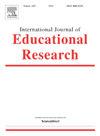Discourse of contemporary chinese ideological and political education: Development directions and teaching methods
Abstract
The aim of this research is to evaluate educational approaches and teaching methods in ideological and political education in China by assessing students' perceptions of ideological and political concepts and their participation in socio-political life. The study is based on the model of the International Civic and Citizenship Education Study (ICCS) and the longitudinal approach to civic education research. The results are moderate and demonstrate that the teaching methods do not promote youth participation in socio-political activities. Among the types of socio-political activities, students are most active in those encouraged by the university (student elections, volunteering), with the main motivation for political activity being additional points and recommendations for job searches. The theoretical contribution lies in the development of theoretical approaches to the thematic analysis of ideological and political education. The practical contribution is a simple and replicable approach for evaluating the methods and outcomes of ideological and political education. The empirical results enable the formation of more successful practices and the implementation of effective modern teaching methods in ideological and political education.

 求助内容:
求助内容: 应助结果提醒方式:
应助结果提醒方式:


